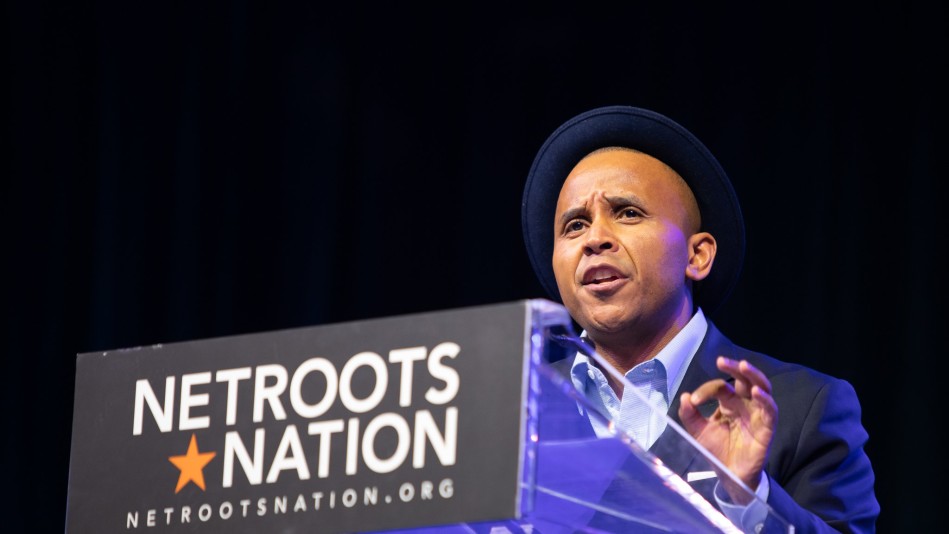
Rashad Robinson: Queen Sugar Tells the Stories We Need about Black Activism
The following Op-Ed was written by Rashad Robinson, President, Color of Change, in response to "Queen Sugar." Currently airing Tuesday nights on OWN, the critically acclaimed drama series from creator Ava DuVernay remains rooted in real-life issues. This season, viewers witness the events throughout 2020 through the lens of the Bordelon family, including the depiction and impact of the Black Lives Matter movement on their community and family.
“The murder of Black people is very acceptable...the fact that it is, is the whole point.” These are the words spoken by Micah West, a young Black man, son and student in Queen Sugar whose mother relocated them to rural Louisiana, years before, to take over the sugarcane farm her father left her. He isn’t just talking about the history of Black people in Louisiana. He’s talking about the very present state of affairs in Minneapolis — and everywhere.
Much like the murder trial of Minneapolis police officer Derek Chauvin filling the air these last two weeks on the news, the recent episode of Queen Sugar on OWN takes us back to May 25, 2020, when Chauvin murdered George Floyd as people stood by shouting to stop him. That’s the day when people around the country realized that not standing up to challenge racism — in all its forms, in all its places — is no longer an option.
Signs and chants filled the air as an unprecedented 22 million people filled the streets in protest all summer, and told the story of George Floyd and racism in America. One year later, Queen Sugar is playing an essential role in the constant telling and retelling of the story of George Floyd. In this case, it’s also the story of a Black family trying to make sense of how law enforcement can get away with treating Black people as inherent threats, as if our very existence warrants violent abuse, rather than as people who belong in the very country we built — people who deserve compassion, protection and security alongside everyone else.
But just as important: in the story that Queen Sugar tells, activism is at the center. On the show, Micah has his own experiences with police abuse. And we see what we usually do not: the long-term harm it causes, the way it rattles and haunts him. We also see Black characters confronting white characters about their complicity, which is rarely modeled so well on TV. And amidst it all, we see Black characters debating how big changes in society happen, and specifically, the role of protest.
As the leader of the largest Black-led organization in online activism, that hits close to home for me. We are in the middle of fighting to make sure the government gives the same Covid relief to Black people and businesses that everyone else is getting, to demand the same level of vaccination outreach that other communities get, and to support Black workers put in harm's way by their employers during Covid.
How can we truly bring an end to the anti-Black violence and discrimination that defines policing and so much of our justice system, medical system, tax system, corporate hiring, employment systems, and nearly every other aspect of our lives? We cannot do it without activism. The show is telling us to watch, and then to act.
Stories like those on Queen Sugar give us a new language for processing the events we see happening around us — and to us — while helping us also feel like we belong in the story ourselves. We are all lead characters in the story of change. This is what happens when we fight to change the rules in Hollywood and create opportunities for incredible talents like series creator Ava DuVernay, director Cierra Glaude and writer and showrunner, Anthony Sparks, to take the stage.
It’s why initiatives like the Color Of Change #ChangeHollywood Roadmap are so important. It’s one way we are shifting both hiring and content development practices across Hollywood, so that shows on television represent the reality of our lives and racism in the world, not a whitewashed fantasy, and so that there is authenticity, balance and equity on screen, and behind the scenes.
The trial of Derek Chauvin is not going to tell the story of the importance of activism in changing how policing America works. We have to tell that story ourselves. In fact, the news wants us to believe that the courts can take care of all these problems if we just let the process play out.
What we know is that this trial would not even be happening if it weren’t for the protests that demanded accountability. And the changes we are seeing in government policy related to Covid relief, police reform and ending mass incarceration are all the result of protest, activism and advocacy — led by Black people, and driven to change society for Black people.
This moment is calling all of us to get involved: to be an activist by telling these stories, by challenging conversions that we see happening that deny our truth, and by getting organized to drive systemic change on issues — from demanding equitable Covid-19 relief for small Black businesses, to holding elected prosecutors accountable and winning justice when they fail to protect Black people, ending qualified immunity that shields police officers from facing accountability in court, and demanding corporations to go beyond their statements in support of Black lives by actually enacting workplace policies that protect Black workers.
It’s about signing-up with organizations that are leading activism and reshaping what justice looks like, joining local organizations focused on voter mobilization and changing local and state laws, connecting with people at work to challenge workplace policies, sharing your experiences and hopes for a different world online, and going out to protest and demand the change you believe in.
Not everyone can tell a story the way Ava DuVernay does. But we can all make sure that the stories we tell and actions we take have as much impact in our own domains as Ava’s do in hers.
Learn more about Color Of Change’s ongoing efforts and sign up to take action at ColorOfChange.org.











